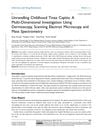14 citations,
January 2020 in “Women's health reports” Iron deficiency in menstruating women causes many health issues beyond anemia and needs early detection and treatment.
 1 citations,
January 2024 in “Journal of the American Pharmacists Association”
1 citations,
January 2024 in “Journal of the American Pharmacists Association” Transgender and gender-diverse adults on hormone therapy often face drug-hormone interactions, especially with multiple psychotropic medications.
 1 citations,
January 2018 in “Turkiye Klinikleri Journal of Dermatology”
1 citations,
January 2018 in “Turkiye Klinikleri Journal of Dermatology” Vitamin D levels are not correlated with chronic hair loss in Telogen Effluvium patients.
August 2023 in “Annales de Dermatologie et de Vénéréologie” Non-scarring hair loss in lupus patients often responds well to treatment and doesn't lead to scarring.
March 2021 in “Juniper Online Journal Material Science” Energy healing treatment improved L-cysteine's stability, solubility, bioavailability, and shelf-life.
 14 citations,
March 2022 in “Journal of inflammation research”
14 citations,
March 2022 in “Journal of inflammation research” Baricitinib shows promise as a new treatment for certain skin conditions like alopecia areata.
 18 citations,
January 2003 in “Gynecological Endocrinology”
18 citations,
January 2003 in “Gynecological Endocrinology” Low-dose finasteride effectively reduces hirsutism without serious side-effects.
 February 2024 in “Infection and drug resistance”
February 2024 in “Infection and drug resistance” Tinea capitis in a child was caused by a fungus from cats, highlighting the need for accurate diagnosis and treatment.
 60 citations,
February 2010 in “Gynecological Endocrinology”
60 citations,
February 2010 in “Gynecological Endocrinology” Metformin combined with lifestyle changes improves insulin resistance and reduces testosterone levels in women with PCOS more than lifestyle changes alone.
 46 citations,
March 2013 in “Journal of Cosmetic and Laser Therapy”
46 citations,
March 2013 in “Journal of Cosmetic and Laser Therapy” Non-ablative and ablative fractional lasers helped hair growth in some cases without major side effects, but didn't work for all hair disorders.
 21 citations,
June 2009 in “Current Medical Research and Opinion”
21 citations,
June 2009 in “Current Medical Research and Opinion” Most men with hair loss worry, try self-treatments, and delay doctor visits due to cost, uncertainty, and embarrassment.
 16 citations,
April 2012 in “Gynecological Endocrinology”
16 citations,
April 2012 in “Gynecological Endocrinology” Older obese women with PCOS have higher cardiovascular and metabolic risks despite lower androgen levels.
 7 citations,
January 2009 in “Immunological investigations”
7 citations,
January 2009 in “Immunological investigations” A 3-year-old boy lost all his hair due to a rare reaction to phenobarbital, but it grew back after steroid treatment.
 947 citations,
February 2004 in “The Journal of Clinical Endocrinology and Metabolism”
947 citations,
February 2004 in “The Journal of Clinical Endocrinology and Metabolism” Most women with excess male hormones have Polycystic Ovary Syndrome, and hormonal therapy can improve symptoms but may cause side effects.
 138 citations,
June 2019 in “Stem Cells and Development”
138 citations,
June 2019 in “Stem Cells and Development” Periodontal ligament stem cells show promise for regrowing tissues but require more research for safe, effective use.
 137 citations,
June 2005 in “Climacteric”
137 citations,
June 2005 in “Climacteric” Estrogen loss during menopause worsens skin health, but hormone replacement therapy may improve it, though more research is needed.
 78 citations,
January 2000 in “Gynecological Endocrinology”
78 citations,
January 2000 in “Gynecological Endocrinology” Norgestimate is the most effective birth control progestin for reducing an enzyme linked to acne and excessive hair growth in women.
 63 citations,
January 2012 in “The European Journal of Contraception & Reproductive Health Care”
63 citations,
January 2012 in “The European Journal of Contraception & Reproductive Health Care” Some birth control pills have a higher risk of blood clots than others.
 43 citations,
January 2007 in “Gynecological Endocrinology”
43 citations,
January 2007 in “Gynecological Endocrinology” Finasteride improves acne and hair loss in women with normal testosterone.
 42 citations,
June 2015 in “Gynecological Endocrinology”
42 citations,
June 2015 in “Gynecological Endocrinology” Women with PCOS often have mood disorders and a lower quality of life, and treatment should focus on both physical and mental health.
 41 citations,
March 2010 in “Psychology Research and Behavior Management”
41 citations,
March 2010 in “Psychology Research and Behavior Management” Using psychological treatments can help manage skin conditions along with regular medical care.
 40 citations,
November 2017 in “International journal of nanomedicine”
40 citations,
November 2017 in “International journal of nanomedicine” DA liposomes with chloramphenicol effectively target hair follicles and combat MRSA with minimal skin toxicity.
 38 citations,
January 1997 in “Gynecological Endocrinology”
38 citations,
January 1997 in “Gynecological Endocrinology” Finasteride and flutamide effectively reduce hirsutism in PCOS women, with flutamide also lowering hormone levels.
 35 citations,
May 2012 in “Expert Opinion on Pharmacotherapy”
35 citations,
May 2012 in “Expert Opinion on Pharmacotherapy” The document concludes that there are various treatments for different types of alopecia, but more research is needed for evidence-based treatments.
 29 citations,
November 2011 in “Human Fertility”
29 citations,
November 2011 in “Human Fertility” Many women with PCOS have undiagnosed health issues and show different symptoms based on the clinic they visit.
 21 citations,
August 2014 in “Gynecological Endocrinology”
21 citations,
August 2014 in “Gynecological Endocrinology” Higher hs-CRP levels in Indian adolescent women with PCOS are more related to BMI than PCOS itself.
 15 citations,
January 2002 in “Gynecological endocrinology”
15 citations,
January 2002 in “Gynecological endocrinology” Hormones affect skin aging and fat distribution, and treatments can help, but only minoxidil is proven for female hair loss.
 15 citations,
August 1998 in “Australasian journal of dermatology”
15 citations,
August 1998 in “Australasian journal of dermatology” The document concludes that various cosmetic and drug treatments are available for hirsutism, and some new drugs show promise.
 14 citations,
March 2010 in “Gynecological endocrinology”
14 citations,
March 2010 in “Gynecological endocrinology” New treatments for excessive hair growth in women include insulin modulators and enzyme inhibitors.
 14 citations,
January 2008 in “Gynecological Endocrinology”
14 citations,
January 2008 in “Gynecological Endocrinology” High levels of male hormones in women without tumors are linked to metabolic problems and can be treated with metformin.


























